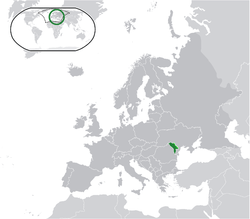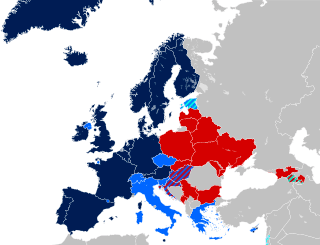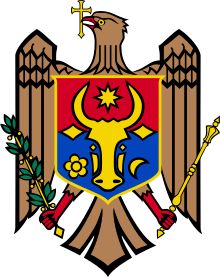LGBT rights in Moldova
| LGBT rights in the Republic of Moldova | |
|---|---|
 Location of Moldova (green) – Transnistria (light green) on the European continent (green + dark grey) | |
| Same-sex sexual intercourse legal status | Yes, since 1995 |
| Gender identity/expression | Yes, right to change legal gender |
| Military service | Gays, lesbians and bisexuals allowed to serve |
| Discrimination protections | Sexual orientation protections in employment (see below) |
| Family rights | |
| Recognition of relationships | No recognition of same-sex relationships |
Restrictions: | Same-sex marriage constitutionally banned |
| Adoption | – |
Lesbian, gay, bisexual, and transgender (LGBT) persons in the Republic of Moldova may face legal challenges not experienced by non-LGBT residents. Households headed by same-sex couples are not eligible for the same rights and benefits as households headed by opposite-sex couples. Nevertheless, Moldova bans discrimination based on sexual orientation in the workplace, and same-sex sexual activity has been legal since 1995.
Since the fall of the Soviet Union, Moldova has come increasingly under the influence of the Orthodox Christian Church. As result, it has been marred by human rights violations, including violations of freedom of association and freedom of speech.[1][2] Moldova's first pride parade was held in 2002. Since then, however, pride parades have encountered stiff opposition from authorities and religious leaders, and have often been cancelled or banned due to safety concerns. A successful pride parade took place in May 2018 in Chișinău, after police officials protected the participants from violent radicals Orthodox groups.
Moldovan society remains very homophobic, and discrimination and violence against members of the LGBT community are commonplace. In 2018, the International Lesbian, Gay, Bisexual, Trans and Intersex Association ranked Moldova 43rd out of 49 European countries with regards to LGBT legislation. This is an improvement from six years prior, when Moldova ranked last.[3][4]
Legality of same-sex sexual activity
Since 1995, homosexuality between consenting adults in private has been legal in Moldova. In September 2002, new laws were introduced equalising the age of consent.[5]
Recognition of same-sex relationships

¹ May include recent laws or court decisions which have created legal recognition of same-sex relationships, but which have not entered into effect yet.
Moldova does not recognise same-sex marriage or civil unions. The Moldovan Constitution explicitly defines marriage as being between a man and a woman.[6]
Discrimination protections
For a long time, a large coalition of human rights organisations, including GenderDoc-M, was lobbying the Moldovan Government for the implementation of anti-discrimination legislation in line with European standards, which would include sexual orientation as a protected ground.
A law, which bans discrimination on the basis of sexual orientation in employment, was adopted by the Moldavian Parliament on 25 May 2012,[7] and signed into law by President Nicolae Timofti on 28 May 2012.[8] The law took effect on 1 January 2013.[9]
Gender identity and expression
Transgender people are allowed to change their legal name and gender on official documents in Moldova, but require a psychiatric diagnosis confirming their "transgenderism" to do so.[4]
LGBT rights movement in Moldova
The main gay and lesbian campaigning group is called GenderDoc-M. The group seeks to support and protect gays and lesbians in Moldova, and raises awareness of the lives of LGBT people.[5]
Social conditions
Gay culture
Moldova has a rather small but lively and open-minded gay scene. Chișinău's first gay club, Jaguar Dance and Music Club, opened in 2009. Moldova's first gay pride parade (named Moldova Pride) was held in April 2002,[5] but it was banned in 2007, because homosexuality was said to "undermine the Christian values of Moldova".[10]
Anti-LGBT sentiment
Moldovan society still remains very homophobic. Virulent homophobic statements are casually made by politicians, and lesbians and gays are routinely discriminated against. Violence towards gay men is not uncommon.[5]
Scott Lively, a vociferous opponent of gay rights who has linked homosexuality to having played a part in the spawning of the Rwandan Genocide and the Holocaust, visited Moldova in 2010 to oppose an anti-discrimination measure. The bill had passed through committee twice before stalling subsequent to opposition from the Party of Communists of the Republic of Moldova, which cited Lively's visit as a reason for its opposition.[11] The bill, however, was approved in 2012.
2008 Moldova Pride controversy
On 11 May 2008, the police and authorities stood by as the Moldova Pride parade was prevented by crowds who surrounded, intimidated and even attacked parade participants. The Mayor of Chișinău, Dorin Chirtoacă, whose campaign slogan was "a young mayor, a liberal team, a European capital", had banned the parade the evening before.[3]
The banning of the pride parade and the crackdown of freedom of assembly drew criticism and concern internationally, including by the British Foreign Secretary.[12][13]
The May 2007 Bączkowski and Others v. Poland ruling was a landmark case, in which the European Court for Human Rights (ECHR) ruled that by banning peaceful pride parades the then Mayor of Warsaw, Lech Kaczyński, had violated three articles of the European Convention of Human Rights: article 11 concerning freedom of assembly, article 13 which deals with the right to appeal, and article 14 which outlaws discrimination.
In 2012, the ECHR ruled that Moldovan authorities had violated human rights by cancelling the 2008 event.[3]
2017 and 2018 events
In May 2017, LGBT activists organised a peaceful march to coincide with the International Day Against Homophobia, Transphobia and Biphobia. Police officials cancelled the event shortly after it started, due to safety concerns because fundamentalist Orthodox groups began attacking pride participants.[14] President Igor Dodon supported the violent attacks, saying: "I have never promised to be the president of the gays, they should have elected their own president." He also personally met the radicals group and congratulated them. Nevertheless, 450 people attended the march, which was the highest ever at the time.[4]
In May 2018, LGBT activists successfully organised the 17th edition of Moldova Pride. Police protected the participants from radicals, using tear gas to repel them. President Dodon again congratulated the radical groups.[15] The event drew support from numerous embassies (Argentina, Belgium, Canada, the Czech Republic, Denmark, Estonia, Finland, France, Germany, Ireland, Italy, Latvia, Lithuania, the Netherlands, Norway, Portugal, Slovenia, Spain, Sweden, Switzerland, the United Kingdom and the United States).[16]
Bans on propaganda of homosexuality
Since 2012, several cities have enacted bans on "propaganda" of homosexuality (which do not include any kind of administrative sanctions or fines). These cities are:
- Bălți, enacted on 23 February 2012,[17][18] and struck down on 28 February 2013[18][19]
- Drochia,[18] enacted on 27 March 2012
- Cahul,[18] enacted on 29 March 2012
- Ceadîr-Lunga,[18] enacted on 10 April 2012
- Glodeni, later repealed[18]
- Rîşcani, later repealed[18]
- Soroca[18]
Similar bans were also enacted in the following districts:
- Anenii Noi,[18] enacted on 1 March 2012
- Basarabeasca[18]
- Fălești[18]
Similar provisions were enacted by following villages of Făleşti District:
- Bocani, later repealed[18]
- Chetriş,[18] repealed on 22 February 2012
- Hiliuți[18]
- Pîrliţa, later repealed[18]
On 30 April 2013, the Parliament of Gagauzia approved a bill to forbid the "propaganda" of homosexuality, bisexuality and transgenderism such as same-sex marriage and adoption by same-sex couples. The bill didn't include any kind of administrative sanctions or fines but some of its provisions banned any LGBT-related organizations from being registered in the region. Another provision was intended to ban any LGBT-related clubs and entertainment establishments. On 20 June 2013, these provisions were invalidated by a court decision, which held that these laws violated freedom of speech and human rights.
On 23 May 2013, despite the anti-discrimination law which prevents discrimination based on sexual orientation in employment, the Parliament of Moldova passed a bill which bans the propaganda of prostitution, paedophilia and "any other relations than those related to marriage and family in accordance with the Constitution and the Family Code". The bill also included fines. The bill was signed into law on 5 July 2013 and came into effect on 12 July 2013. The law did not explicitly prohibit the "propaganda" of homosexuality, but it could have been interpreted as such by judges.[20][21]
On 11 October 2013, the Parliament passed a bill intended to remove the content which could have been interpreted as "homosexual propaganda".[22][23]
UN Human Rights Council resolution
In June 2011, Moldova used its seat on the United Nations Human Rights Council to vote against the first successful UN resolution condemning discrimination and violence against individuals based on their sexual orientation and gender identity.[24]
Summary table
| Same-sex sexual activity made legal | |
| Equal age of consent | |
| Anti-discrimination laws in employment | |
| Anti-discrimination laws in the provision of goods and services | |
| Anti-discrimination laws in all areas, (including hate speech) | |
| Anti-discrimination laws concerning gender identity | |
| Recognition of same-sex unions | |
| Same-sex marriage | |
| Stepchild adoption by same-sex couples | |
| Joint adoption by same-sex couples | |
| Right to change legal gender | |
| Gays, lesbians and bisexuals allowed to serve in the military | |
| Access to IVF for lesbians | |
| Commercial surrogacy for gay male couples | |
| MSMs allowed to donate blood |
See also
Notes
- ↑ Intergroup reminds Moldova that Right to Freedom of Assembly is a prerequisite to EU accession Archived 27 September 2007 at the Wayback Machine., ILGA Europe
- ↑ Moldova: Country Reports on Human Rights Practices – 2006, U.S. Department of State
- 1 2 3 Of All Places, Is Moldova Leading on Gay Rights?
- 1 2 3 Rainbow Europe: Moldova
- 1 2 3 4 Lesbian and Gay Moldova Archived 29 September 2006 at the Wayback Machine., Gay Times
- ↑ Constitution of the Republic of Moldova Archived 26 April 2006 at the Wayback Machine.
- ↑ (in Russian) Парламент принял в двух чтениях Закон об обеспечении равенства, отказавшись проводить процедуру поименного или тайного голосования, MoldNews
- ↑ (in Russian) Избранный президент Николае Тимофти промульгировал Закон об обеспечении равенства, Moldnews
- ↑ (in Moldovan) Proiectul legii cu privire la asigurarea egalității, Parlament.md
- ↑ Gay Pride banned despite court ruling, Pink News, 18 April 2007
- ↑ "Spero NewsGay Rights At Center Stage In Battle Over Moldova Antidiscrimination Bill". Retrieved 23 August 2015.
- ↑ Ban of the Gay Pride in Moldova, lack of police protection, violation of human rights
- ↑ Re: Moldova Pride Sat 11 May 2008
- ↑ Moldova LGBT march halted as President says: ‘I am not president of the gays’
- ↑ Moldovan Police Repel Orthodox Activists Trying To Crash LGBT March
- ↑ Police in Moldova use tear gas on anti-LGBT protesters trying to disrupt Pride march, PinkNews, 22 May 2018
- ↑ "Moldova city bans 'gay propaganda'". Gay Star News. Retrieved 23 August 2015.
- 1 2 3 4 5 6 7 8 9 10 11 12 13 14 15 "Venice Commission :: Council of Europe". Retrieved 23 August 2015.
- ↑ "Moldova: Second largest city overturns local ban on 'gay propaganda'". PinkNews. Retrieved 23 August 2015.
- ↑ Michelle Garcia. "Moldova Secretly Enacts Propaganda Law Similar To Russia's". Advocate.com. Retrieved 23 August 2015.
- ↑ E-Li. "Moldovan LGBT Community Wake Up With A 'Gay Propaganda' Law Approved By Their Government - Lezbelib". Retrieved 23 August 2015.
- ↑ "Moldova Rejects 'Gay Propaganda' Law". RadioFreeEurope/RadioLiberty. Retrieved 23 August 2015.
- ↑ "Moldova cancels 'gay propaganda' ban, eyeing EU entry". Retrieved 23 August 2015.
- ↑ "UN backs gay rights for first time ever". Retrieved 23 August 2015.
